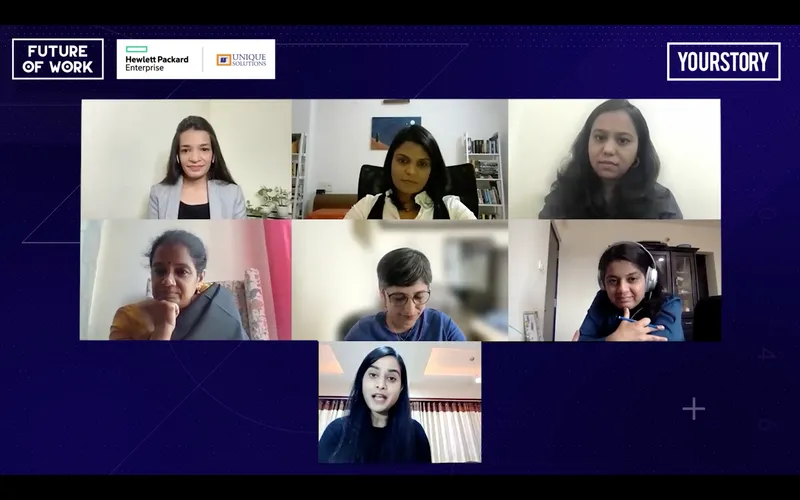Future of Work: Is the new normal of ‘Working from Home’ a boon for women?
On Day 1 of YourStory's Future of Work 2021, women leaders from across the spectrum of technology and management debate whether the new normal has furthered women's chances of getting into leadership roles.
It has been about a year since the whole world shifted to a virtual and remote working setup. That being said, many companies have reopened their offices with a percentage of employees, while others have shut their physical offices altogether.
That being said, has this new normal empowered the women workforce considering that this has helped them seamlessly divide their time between work and home?
On Day 1 of Future of Work 2021, Shraddha Kandpal, Engineering Manager, ; Jayalakshmi Manohar, Founder & CPO, ; Aishwarya Kalakata, Head of Product Innovation, ; Gunjan Shukla, Market Partner - SEA and Australia, ; Anuradha Balasubramaniam, Vice President, Global BPS Delivery, DXC Technology; Pooja Patel, Vice President, Product Delivery, discuss the new normal for women in tech in a roundtable session moderated by Vishakha Vaidya, Engineering Manager, Atlassian.
Kicking off the session, Aishwarya Kalakata said, “The biggest lesson that all of us have learnt in the past year is that we aren’t tied to a location to get our work done or run our companies. Organisations have been able to trust their employees and provide a more output-based evaluation rather than a face-time based one.”
“Based on my experience, women are better able to balance work and home, not choosing between one or the other. We’ve been able to successfully remove the stigma that was otherwise attached to work-from-home and that adds a lot more to everybody’s life,” she added.
She further explained that the work-from-home setup has given young women a lot of confidence and they are no longer scared of having to choose between work and home.
Opening doors for women
The new normal of working has definitely opened a number of opportunities to many women, especially those who are not a part of the workforce because of other family commitments, shared Vishaka Vaidya, adding, “It’s now easy for women to work from the comfort of their homes without having to uproot their lives."

Participants in the 'What's the new normal for women in tech' session on Day 1 of YourStory's Future of Work 2021
Anuradha says that women are more adaptive and have found their own 'new normal’. “However, with this new normal, people are trying to build a culture within the organisation and women, with their empathy and leadership can play a very strong role to build that culture,” she said.
But in the race to capture the opportunity, women end up devoting more of their time to their work, while managing to keep up with their schedules.
Pooja Patel has a different take on the idea of what women actually need. “I think what women are looking for is a trusting culture in the companies,” says Pooja adding, “We need to help them grow personally and professionally.”
The current state of inclusion
Taking a break is never easy for women. In fact, at some point, women are often scared to take a long break from their work lives because they feel that their jobs may not be there when they get back. However, the current state of work is witnessing a major shift, with more consideration and inclusion of women.
Further elucidating the point, Pooja said that as an organisation, when you start demonstrating that you have non-discriminatory qualities, that’s when employees start believing in you and work with you for a longer time.
If you feel like you are missing out on an opportunity because you’re a woman, Shraddha Kandpal shares that it is important to speak out. “It all comes down to communicating. Only if you make your voice heard... only then will things align.”
Jayalakshmi Manohar, a big advocate of self-learning, quotes a McKenzie report, which states that about 47 percent of entry-level employees are women, 37 percent at the manager level, and even lesser for C-suite roles, which is quite a serious problem women have been facing. “But the new normal will definitely change these statistics, and if the current awareness is capitalised, well, I think we can get there.”
Upskilling during the break
In a nutshell, Aishwarya explains that is the responsibility of the individual as well to make sure to be in touch and upskill during their time away, so that they will be able to get in directly without any gap. Moreover, if the company is more accepting of this, and makes it easier for women to get back to work, it speaks volumes of its values.
Adding to Aishwarya’s point Anuradha says, “If you are in a leadership role, for you to be open, speak up, and help the people working under you is very important. We need to take time out to see the people working with us, and help them reach the same position as us.”
Pooja, who took a year's sabbatical from LogiNext shared that she was able to think about how the break really helped her become a better employee. “When the organisation also accepts this and is able to hire somebody back again based on their potential, it shows a lot about their culture.”
Echoing that thought, Gunjan Shukla shares a story of how a friend was offered a leadership position in her company right after her maternity leave. “This created a lot of positivity in the environment in terms of expecting something that is actually possible.”
“Whether you’re a man, woman or a company as whole, it is very essential to stay ahead. The world only rewards those who have been upskilling and building a future,” shared Jayalakshmi.
A big shout out to our Future of Work 2021 Co-presenting Sponsors Hewlett Packard Enterprise and Unique Solutions; Digital Excellence Partner, Google Cloud; Associate Sponsor HP and Intel; and Sponsors: Atlassian, Freight Tiger, Archon I Cohesity, TeamViewer, and Pocket Aces.

Edited by Diya Koshy George









